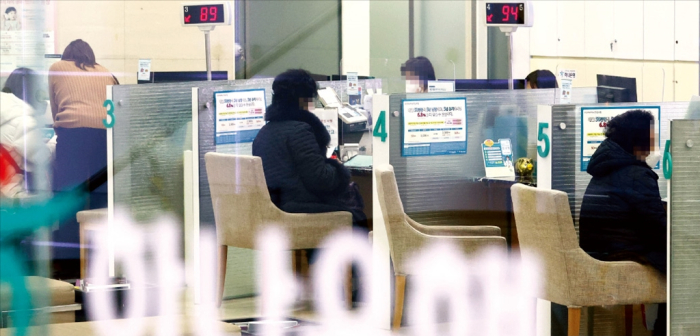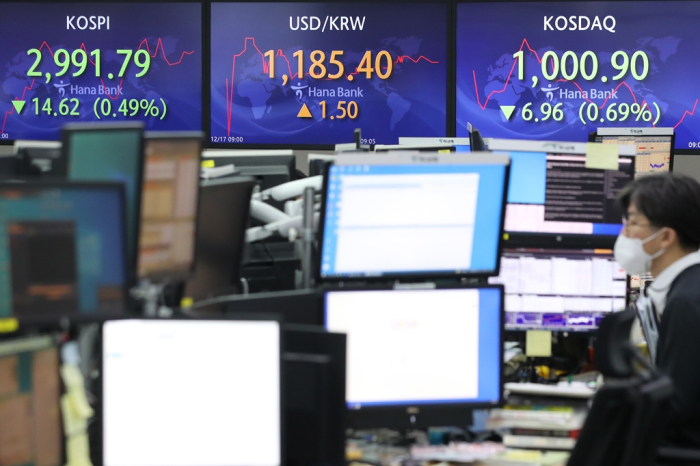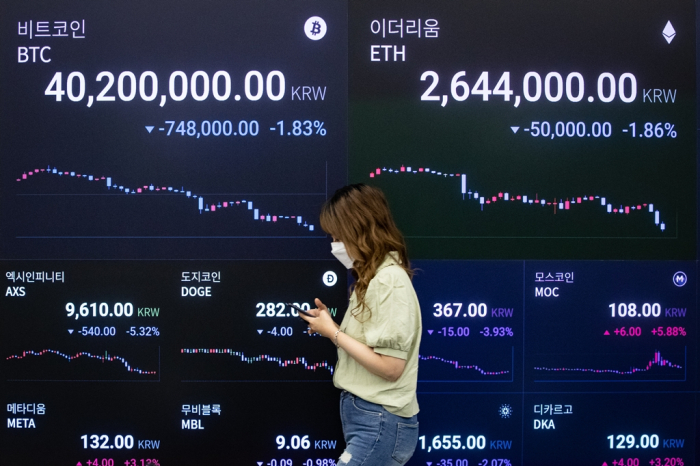Banking & Finance
Money moves back to safe assets in Korea amid rising interest rates
Fund flows into stocks and crypto exchanges keep falling as banks siphon off ample market liquidity
By Dec 20, 2021 (Gmt+09:00)
3
Min read
Most Read
Alibaba eyes 1st investment in Korean e-commerce platform


Blackstone signs over $1 bn deal with MBK for 1st exit in Korea


NPS loses $1.2 bn in local stocks in Q1 on weak battery shares


OCI to invest up to $1.5 bn in MalaysiaŌĆÖs polysilicon plant


Korea's Lotte Insurance put on market for around $1.5 bn



With stock and cryptocurrency fevers subsiding amid a monetary tightening bias, South Koreans are moving their money back to safe assets, as banks start to raise interest rates to woo investors.
Investor interest in the equity, property and cryptocurrency markets is dwindling in line with the growing financial market uncertainty as central banks around the world are shifting their policy priority from supporting economic growth to taming rising inflationary pressure via interest rate hikes.
The quick global spread of the COVID-19 Omicron variant is also fanning fears that investors may lose money from their heavy bet on risky assets, including stocks.
Last month, the Bank of Korea increased its policy rate for the second time in three months to 1.0% to cool the overheating housing market and ease inflationary pressure.
KoreaŌĆÖs consumer inflation accelerated to a near 10-year-high in October despite the rate hike in August.
The central bank also signaled strongly that it would hike rates further in 2022, ending its ultra-easy monetary policy stance, in line with similar moves by its global peers, notably the US Fed, which is widely expected to raise rates at least three times next year.

FURTHER INTEREST RATE HIKES
According to the Korea Financial Investment Association on Monday, money deposits at brokerages for stock investment reached 63.6 trillion won ($53.5 billion) as of Dec. 16, down 4.8% from a month earlier.
By contrast, deposits at the countryŌĆÖs five largest banks ŌĆō Kookmin, Shinhan, Hana, Woori and NongHyup ŌĆō stood at 1,398 trillion won as of Dec. 16, up 11 trillion won from the end of November.
The BOKŌĆÖs policy rate hikes have also prompted local lenders to follow suit.
Most Korean banks and financial institutions recently raised their deposit interest rates by 0.4 to 0.6 percentage point to siphon off ample market liquidity.
Industry watchers said banks will be willing to hike interest rates further in their own efforts to secure funds at relatively lower borrowing costs, as they expect additional policy rate increases by the BOK next year.
ŌĆ£Money moves into safe assets will accelerate once the Fed starts raising its rates and speeds the end of its bond-buying,ŌĆØ said Hwang Sei-woon, senior researcher at Korea Capital Market Institute.
When Woori Bank marketed 1 trillion won worth of a one-year term deposit product with an annual interest rate of 1.53% last week, the product sold out in fewer than five days.

HOUSEHOLD BORROWING IN DECLINE
At the current level of speed, as much as 20 trillion won is expected to flow into the entire banking industry this month alone, looking for higher interest rates, analysts said.
That compares with increases of 4 trillion won and 5 trillion won in September and October, respectively.
The fast money moves back to safe assets come as the main Kospi stock index has been hovering around or below the psychologically important 3,000 points for months.
In early Monday trade, the Kospi index was down 1.5% at 2,973.7, while the junior Kosdaq index shed 0.5% at 995.8.
The daily transaction values on the Kospi market are currently about 10 trillion won, much smaller than 44 trillion won earlier this year.
The local cryptocurrency market is also seeing dwindling money inflows.
The won currency deposits at Upbit, KoreaŌĆÖs largest cryptocurrency exchange, was 6.4 trillion won at the end of November, down from 6.9 trillion won at the end of September.
As interest rates are on an ascending trend, the increase in mortgage loans has also slowed, with a rise of 2.4 trillion won in such borrowings in November, the slowest growth in three years and nine months.
Write to Dae-Hun Kim, Jin-Woo Park and Nan-Sae Bin at daepun@hankyung.com
In-Soo Nam edited this article.
More to Read
-
 EconomyKorean inflation nears 10-year peak in November, fanning rate hike views
EconomyKorean inflation nears 10-year peak in November, fanning rate hike viewsDec 02, 2021 (Gmt+09:00)
1 Min read -
 Central bankingBank of Korea raises interest rates, signals further hikes
Central bankingBank of Korea raises interest rates, signals further hikesNov 25, 2021 (Gmt+09:00)
3 Min read -
 CryptocurrenciesKorean politicians seek to delay crypto taxation as another bubble looms
CryptocurrenciesKorean politicians seek to delay crypto taxation as another bubble loomsNov 03, 2021 (Gmt+09:00)
3 Min read -

-
 CryptocurrenciesKoreaŌĆÖs top cryptocurrency exchange operator becomes decacorn
CryptocurrenciesKoreaŌĆÖs top cryptocurrency exchange operator becomes decacornSep 23, 2021 (Gmt+09:00)
1 Min read -
 Deep Dive: CryptocurrenciesGrowing pains: KoreaŌĆÖs smaller crypto exchanges face shutdown
Deep Dive: CryptocurrenciesGrowing pains: KoreaŌĆÖs smaller crypto exchanges face shutdownAug 05, 2021 (Gmt+09:00)
5 Min read -
 EconomyNew FSC chief nominee tough on household debt, against cryptocurrencies
EconomyNew FSC chief nominee tough on household debt, against cryptocurrenciesAug 06, 2021 (Gmt+09:00)
2 Min read
Comment 0
LOG IN


